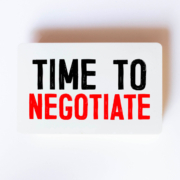8 Tips for Negotiating in the Digital Era – Be Careful of the Pitfalls!
8 Tips for Negotiating in the Digital Era – Be Careful of the Pitfalls!
Navigating the Digital Landscape: Strategies to Avoid Common Negotiation Traps
Electronic negotiations have become the norm in today’s fast-paced and competitive business world and the post-COVID environment (residual reduced face-to-face contact.) In a professional capacity, people working in sales, procurement, and cross-functional departments often navigate the challenging terrain of e-mail threads, PDF attachments, proposals, RFP/RFQ/price quote responses, and Zoom calls to close profitable deals promptly.
However, there’s a significant catch – purchasing/supply chain professionals now have a distinct advantage when negotiations move into the digital realm. In this article, I’ll explore some of the pitfalls of electronic negotiations and provide essential tips to help people level the playing field.
I’m not a proponent of salespeople negotiating digitally. However, I understand there are a variety of limitations that may limit in-person meetings. If possible and feasible, I advise my clients in the sales profession that all high-value and strategically important negotiations should occur in person.
CONTINUE READING ... SUBSCRIBE TO UNLOCK THE COMPLETE ARTICLE
Gain access to our library of complete articles that contain proven negotiation strategies, tips, and expert insights when you subscribe.
Enhance your negotiating skills and achieve better results!
The Digital Disadvantage
Salespeople, especially those who rely heavily on face-to-face interactions, can be disadvantaged in the electronic negotiation arena. Here are some common pitfalls:
- The Importance of Body Language and the Loss of Some Non-Verbal Cues: In-person negotiations allow us to read body language, facial expressions, and tone of voice. In e-mails and on some Zoom/Microsoft Teams (or other platforms) calls, these valuable cues are often lost, making it challenging to gauge the other party’s true intent.
- Delayed Responses: E-mail negotiations can lead to prolonged response times, causing frustration and potentially allowing the other party to control the pace of the negotiation.
- Misinterpretation: Written communication can often be misinterpreted, leading to misunderstandings that could derail the negotiation process. This is especially true when some people use lazy and poorly written correspondence.
Mastering the Art of Electronic Negotiations
To become a better negotiator in today’s digital world, people must adapt their approach and utilize effective strategies to succeed in electronic negotiations. Here are some tips to help you navigate this digital landscape:
- Craft Clear and Concise E-mails: Avoid lengthy, convoluted e-mails. Be direct and organized – use bullet points or numbered lists to make your points stand out. Write new and clear e-mail subject line titles. Please stop sending e-mails on top of e-mail threads irrelevant to the new topic. Make sure you incorporate deadlines, incentives, and penalties. Don’t be lazy!
- Set the Tone: Begin with a polite and professional tone in your e-mails. Clearly state your objectives and expectations for the negotiation process.
- Use the Power of Video: In negotiations using a digital platform, leverage video to establish a more personal connection. Maintain eye contact, smile, and project confidence. Be careful about distracting and silly background images/props/furniture/bookshelves/artwork that people can see on Zoom calls. Invest in proper technology. P.S. – I teach people how to look for, analyze, and decipher important clues about people’s personality types and corresponding negotiating styles from visual background images in virtual meetings.
- Request Real-Time Communication: Suggest real-time discussions through Zoom or other video conferencing platforms when appropriate. This can help clarify details and build rapport.
- Hidden Meanings in Conversation: Pay meticulous attention to what you say/write. Be alert regarding what the other side says or writes in negotiations.
- Mind Your Language: Be cautious with your choice of words. Avoid jargon or ambiguous phrases that could be misinterpreted. Seek clarity and confirmation when necessary.
- Employ PDF Attachments Strategically: When sending price- or solution-based proposals, value proposition documents, or RFP/RFI/RFQ documents, ensure they are well-written and organized, easy to navigate, and visually appealing/interesting. Use annotations or highlights to draw attention to critical points. Contact me to learn more about the problems and opportunities associated with using the term “quote” in negotiations.
- Practice Patience: Don’t rush electronic negotiations. Give the other side adequate time to respond and consider their position. Impatience can lead to concessions that you might later regret.
During our negotiation skills training seminars, workshops, and negotiating coaching sessions, we provide our clients with turnkey examples, samples, templates, and tools to help people improve their communication practices to manage the negotiation process. These “done for you” templates and tools help people close profitable deals successfully.
Conclusion
In the age of electronic negotiations, businesspeople in any industry must adapt and refine their skills to succeed. While it’s true that purchasing professionals may have some advantages in the digital negotiating landscape, mastering the art of electronic negotiation is a crucial step toward levelling the playing field for salespeople and sales management.
You can build trust and foster successful negotiations by crafting explicit, concise e-mails, setting the right tone, and using technology effectively. Electronic negotiations require negotiation skill development, patience, adaptability, and a keen understanding of digital dynamics. With the tips from this article in your arsenal, you can navigate the digital negotiation landscape with greater confidence and success.
Take Action and Invest in Our Expert Negotiating Training and Negotiation Coaching Packages, Negotiation Tools, and Online Course to Become a Better Negotiator.
» Negotiating Skills Training: Book a tailored in-house presentation, seminar or learning workshop for your organization.
Speaking Engagements – Industry Associations and Companies: Book a tailored, engaging, and impactful 60-minute to two-hour presentation at an upcoming meeting, conference or convention.
» Negotiating Coaching Packages: If your company is facing a challenging high-value negotiation and you need an expert to help you or your team – or you own a small business – or you’re an individual who needs practical negotiation advice, you can benefit from my investing in one of my three proven, results-producing negotiation coaching packages for individuals, small business owners or corporations.
» Digital Negotiation Learning Products: You can purchase my three E-books containing powerful strategies and tips. E-books: Forensic Blueprinting Questions For Effectively Selling and Negotiating Price or Fee Increases and Managing the Price-driven Sale, Selling and Negotiating Price or Fee Increases in Any Economic Environment, and Strategies and Tips on How to Effectively Manage the RFP/RFQ/RFI or Bid/Tender Process to Optimize Results and Outcomes.
You can also purchase the Negotiating Personality Type and Corresponding Negotiating Style Self-Assessment Questionnaire and Interpretation Results and my NEW Digital MP3 “Greatest Hits” Verbal Negotiating Phrases, Scripts, Questions, and Questioning Techniques. These helpful tools are in digital format and can be easily downloaded.
I provide a discounted Master Negotiator Bundle with all my Digital Learning Products.
» Online Sales Negotiation Course: If you’re in sales, sales management or a cross-functional role that supports sales, you can benefit from enrolling in my NEW self-paced Negotiating for Sales Success online course.
» Meet Negotiating Coach® Michael E. Sloopka
No part of this copyright material can be used without written permission from Selling Solutions Inc.













